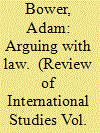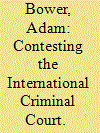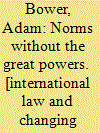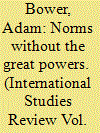|
|
|
Sort Order |
|
|
|
Items / Page
|
|
|
|
|
|
|
| Srl | Item |
| 1 |
ID:
139581


|
|
|
|
|
| Summary/Abstract |
Recent studies have highlighted the instrumental use of language, wherein actors deploy claims to strategically pursue policy goals in the absence of persuasion or socialisation. Yet these accounts are insufficiently attentive to the social context in which an audience assesses and responds to strategic appeals. I present a theoretical account that highlights the distinctly powerful role of international law in framing strategic argumentation. Legalised discourses are especially legitimate because law is premised on a set of internally coherent practices that constitute actors and forms of action. I then illustrate the implications in a hard case concerning US efforts to secure immunities from International Criminal Court jurisdiction. Contrary to realist accounts of law as a tool of the powerful, I show that both pro- and anti-ICC diplomacy was channelled through a legal lens that imposed substantial constraints on the pursuit of policy objectives. Court proponents responded to US diplomatic pressure with their own legal arguments; this narrowed the scope of the exemptions, even as the Security Council temporarily conceded to US demands. While the US sought to marry coercion with argumentative appeals, it failed to generate a lasting change in global practice concerning ICC jurisdiction.
|
|
|
|
|
|
|
|
|
|
|
|
|
|
|
|
| 2 |
ID:
164462


|
|
|
|
|
| Summary/Abstract |
The International Criminal Court (ICC) is the centerpiece of an expanding international norm of nonimpunity, which holds that all individuals should be equally subject to accountability for atrocity crimes. Despite rapid institutional growth, the ICC faces a number of challenges, including enduring resistance to the prosecution of senior state officials. Over the past decade, a number of African states have attempted to suppress ICC cases against Sudanese President Omar al Bashir and Kenyan President Uhuru Kenyatta and enshrine formal exemptions from ICC jurisdiction for sitting Heads of State. In this article, I focus on the dynamics and impact of contestation in a highly institutionalized environment. The ICC is embedded within a dense network of overlapping legal rules and norms and, as a consequence, debates over its operation and legitimacy are primarily undertaken via the distinctive discourses and practices of international law. I argue that, despite often vociferous challenges, contestation surrounding Bashir and Kenyatta has not led to an erosion of the nonimpunity norm because challenges have been largely conducted through modes of “applicatory contestation” that are less damaging to the foundational validity of the norm. Legalization has thus played a dual role, providing strategic justifications for attempts to narrow the scope of nonimpunity, but also empowering counter-contestation by pro-norm constituencies.
|
|
|
|
|
|
|
|
|
|
|
|
|
|
|
|
| 3 |
ID:
171223


|
|
|
|
|
| Summary/Abstract |
In 2014, the Obama administration announced that the United States would almost entirely adopt the global ban on antipersonnel (AP) mines, despite longstanding military and political opposition. To explain this puzzling outcome, I expand upon recent accounts of rhetorical entrapment in which norm-promoting actors seek to compel change in a target actor by exploiting tensions between the target’s words and actions. Tracing US policy change over the past 25 years, I show how transnational civil society and domestic political elites strategically deployed factual and normative claims to draw US officials into an iterative debate concerning the humanitarian harm of AP mines. Successive US administrations have sought to mitigate external critique by gradually conceding to the discursive framing of pro-ban advocates without endorsing the international treaty prohibiting the weapons. These rhetorical shifts stimulated a search for alternative technologies and incremental changes to military doctrine, tactics, and procurement that constrained US policy choices, culminating in the effective abandonment of AP mines despite ongoing military operations around the globe.
|
|
|
|
|
|
|
|
|
|
|
|
|
|
|
|
| 4 |
ID:
152783


|
|
|
|
|
| Publication |
New York, Oxford University Press, 2017.
|
| Description |
xxii, 288p.hbk
|
| Standard Number |
9780198789871
|
|
|
|
|
|
|
|
|
|
|
|
Copies: C:1/I:0,R:0,Q:0
Circulation
| Accession# | Call# | Current Location | Status | Policy | Location |
| 059056 | 327.1/BOW 059056 | Main | On Shelf | General | |
|
|
|
|
| 5 |
ID:
141288


|
|
|
|
|
| Summary/Abstract |
In the past two decades, a series of major multilateral treaties were created in the absence of support—and often in the face of sustained opposition—from the United States and other emerging global leaders like China, India, and Russia. These institutions present a puzzle to prominent theories of IR because they fail to encompass predominantly powerful actors regarded as most consequential to the development and enforcement of international rules, raising questions as to their potential efficacy. This paper addresses the prospects for non-great power law in theoretical and empirical terms. I first draw on constructivist conceptions of international law as a social practice to demonstrate how multilateral treaties may generate powerful new social expectations and alter behavior even when they do not correspond to the prevailing distribution of material power in the international system. Treaties are embedded within an international social system composed of legal and non-legal elements, and these structural features generate social pressures that bear on formal members and non-parties alike. I then apply this account to an archetypal—and hard—case, the ban on antipersonnel mines. Contrary to skeptical assumptions, I demonstrate that the Mine Ban Treaty has instantiated a powerful new international social standard which has generated widespread behavioral change among treaty members—challenging accounts that emphasize enforcement by leading states—and non-parties including major military powers like the United States—challenging the view that great powers avoid new institutional developments not to their liking.
|
|
|
|
|
|
|
|
|
|
|
|
|
|
|
|
|
|
|
|
|